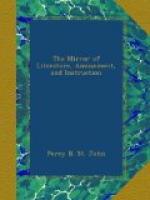“The houres wherein the principal devills may be raised.—A king may be raised from the third houre till noone, and from the ninth hour till evening. Dukes may be raised from the first hour till noon, and clear weather is to be observed. Marquesses may be raised from the ninth hour till compline, and from compline till the end of day. Countes, or earles, may be raised at any hour of the day, so it be in the woodes or fieldes, where men resort not. Prelates likewise may be raised at any houre of the day. A president may not be raised at any hour of the day, except the king, whom he obeyeth, be invocated; nor at the shutting in of the evening. Knights from day-dawning till sun-rising, or from even-song till sun-set.
“The forme of adjuring and citing the spirits aforesaid to appeare.—When you will have any spirit, you must knowe his name and office; you must also fast and be cleane from all pollution three or foure days before; so will the spirit be more obedient unto you. Then make a circle, and call up the spirit with great intention, rehearse in your owne name, and your companion’s, (for one must alwaies be with you,) this prayer following; and so no spirit shall annoy you, and your purpose shall take effect. And note how thw prayer agreeth with popish charmes and conjurations.”
The prayer alluded to (see Scot’s Discovery, b. 15, c. 2) is of the most diabolical and blasphemous nature. A contemporary writer observes, that there is not the least doubt but that the witches of the olden time observed all the formalities of these ridiculous and disgusting ceremonies to the very letter. In later times, however, though the formalities were quite simple, yet the hag of the sixteenth century exercised her vocation with all its ancient potency.
The broomstick has been the theme of many a story connected with this subject:—
As men in sleep, though motionless they
lie,
Fledged by a dream, believe they mount
and fly;
So witches some enchanted wand bestride
And think they through the airy regions
ride.
But the reason of its possessing such extensive powers of locomotion, or rather aerostation, is not generally understood. The witches either steal or dig dead children out of their graves, which are then seethed in a cauldron, and the ointment and liquid so produced, enables them, “observing certain ceremonies, to immediately become a master, or rather a mistresse, in the practise or faculty” of flying in the air:—
High in, air, amid the rising storm ——wrapt in midnight Her doubtful form appears and fades! Her spirits are abroad! they do her bidding! Hark to that shriek!
In addition to the above, they possessed another very useful faculty, for the transfer of the patent of which, I doubt not scores of adventurers would have given a tolerable consideration. It is briefly that of “sailing in an egg-shell, a cockle, or a muscle-shell, through and under the tempestuous seas.”




